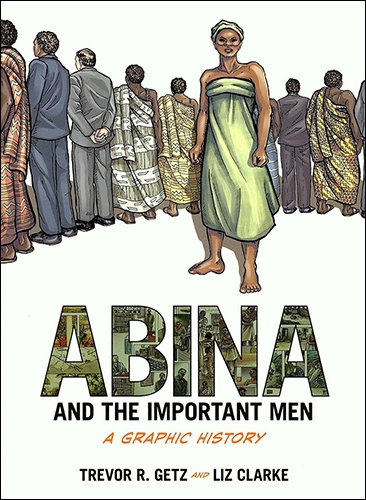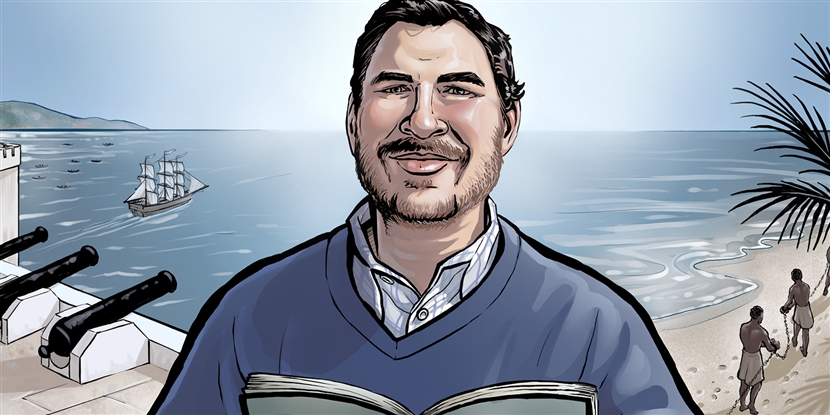Bennett Sherry
January 3, 2020
“A kid in a ball pit.” “Prolific.” “Inspiring.” “Dream big or go home.” “A warm, crackling bonfire.” These are all words and phrases colleagues of Trevor Getz use to describe him. Those who know Trevor—students, friends, and historians—will doubtless read these words below and smile knowingly. But they will also certainly come to the same one-word conclusion: deserving. Trevor has been awarded the Eugene Asher Distinguished Teaching Award. It is an honor well-deserved.
 This is the second time that the AHA has honored Trevor for his teaching. In 2014, he was awarded the James Harvey Robinson prize for outstanding teaching aid for his graphic history, Abina and the Important Men. This year, Trevor has been awarded the Eugene Asher Award for “outstanding teaching and advocacy for history teaching.” The award honors “inspiring teachers whose techniques and mastery of subject matter made a real difference to students of history.”
This is the second time that the AHA has honored Trevor for his teaching. In 2014, he was awarded the James Harvey Robinson prize for outstanding teaching aid for his graphic history, Abina and the Important Men. This year, Trevor has been awarded the Eugene Asher Award for “outstanding teaching and advocacy for history teaching.” The award honors “inspiring teachers whose techniques and mastery of subject matter made a real difference to students of history.”
Unlike those whose words are quoted below, I have known Trevor only a brief time. Yet in that short period of time, Trevor has quickly become a colleague and mentor. And like the many, many others he has taught, I find myself learning new things with each conversation. These conversations range from the nature of empire to LEGO architecture, but each comes with the same smile and attention. Trevor expects excellence, from himself and from others, and he throws himself into the work of making excellent things. He is tireless in his efforts to create “usable history” with his students. By revealing the untold stories of figures like Abina, guiding his students to do the work of historians, and centering issues of social justice, Trevor is pushing the borders of pedagogy. With Trevor as a teacher and colleague, the work of doing history is collaborative and joyful. (Just don’t ask him for a cup of Earl Grey).
But, in the spirit of Professor Getz, who would certainly encourage his students to claim test, don’t believe it just because I say it. Consult the evidence. The praise of Trevor’s colleagues below joins Abina, the World History Project; a dozen books; multiple awards, articles, and multimedia projects; and—most important—over two decades of students, as evidence in the narrative of Trevor Getz. Quite a usable history.

Portrait of Trevor. By Peter Quach, http://peterquach.com.
Bob Bain is associate professor of educational studies and history at the University of Michigan. He and Trevor are the academic leads on the World History Project. Their voices are woven into the fabric of this course, developing concepts of narrative frames and useable history that puts the tools—and facts—of history into students’ hands.
I have been a student of Trevor Getz’s long before I met him. Indeed, I studied both history and the teaching of history with Professor Getz years before ever seeing him in person or on the web. It began years ago when I was on the AHA’s James Harvey Robinson Committee to select the book or article that made the most significant contribution to the teaching of history. The committee unanimously selected Abina and the Important Men, a graphic history written by Trevor and illustrated by Liz Clarke. From reading Abina, I learned a lot about Ghana, about colonialism, about gender, about emancipation in the late eighteenth century. It is a wonderfully smart and approachable history, a delight to read, one that provided a compelling historical story, a primary source, historical context, maps, and commentary from others. It taught me lots of history about a time and place I knew about only most generally and enabled me to connect that time and place to others I knew far more about.
However, that book also taught me ways to teach history, ways we could show students how historical accounts are made, and the virtue of making visible to learners the materials, details, and processes that go into making a history, as well as the necessary leaps we must make to construct a coherent account of the past—what Collingwood called the “historical imagination.” For teachers of history, I think the book laid bare the pedagogical materials, processes, details, and necessary leaps—the educational imagination—required to teach history and the “doing” of history.
So, as a graduate of one of Trevor’s virtual courses in history and how to teach history, I am very pleased—and not surprised—that the AHA has awarded him a second honor for his teaching. I’m even more pleased that I have the opportunity to continue my advanced work with Trevor. He is one of those teachers whose smarts are matched by his commitment, compassion, and energy. Bravo, Trevor!
Bob Bain
University of Michigan
This sort of high praise seems to follow Trevor through his work and acquaintances. Bob Regan, director of education at Gates Ventures, has worked alongside Trevor and Bob Bain to direct and shape the World History Project into a course that brings Trevor’s enthusiasm for “doing history” into high school classrooms.
For the last two years, I have had the pleasure of working side by side with Trevor in developing the World History Project. We should all be so lucky. He is a man of incredible depth in both knowledge and spirit and at the same time, someone who is capable of tremendous joy. I will never forget the first day he joined our team. We spent the whole day toiling over our initial framework and everyone was pretty tired and a tad grumpy—except Trevor. ‘I just have to say something,’ he said, smiling. ‘Isn’t this the best? I feel like a kid in a ball pit.’ Every day since, he’s pretty much stayed there and he’s managed to help the most jaded among us find our own respective happy place. This award for teaching is tremendous recognition for someone who, in his imaginary free time, devotes his energy to improving instruction through his side project, History for the 21st Century. Able to think about the classroom and the scholar at the same time, he is a rare individual indeed. Congrats, Trevor!
Bob Regan
Gates Ventures
Trevor’s impact as a teacher and world historian extends far beyond the World History Project. Heather Streets-Salter (professor of history at Northeastern University); Laura Mitchell (associate professor of history at UC Irvine and president elect of the World History Association); Molly Warsh (associate professor of history at the University of Pittsburgh); Tony Yeboah (Yale University); Shane Carter (UC Berkeley); and Joe Schmidt (senior instructional specialist, New York City Department of Education) can each personally confirm Trevor’s generosity, pedagogy, and general awesomeness. Heather, for one, was unsurprised when she heard that Trevor was being honored for his teaching.
The answer to ‘Did Trev win a teaching award?’ should be ‘Duh. Of course.’ Aside from being one of the most generous and helpful people I’ve ever worked with, I was always so impressed with the way Trevor conceptualized truly difficult material into just the right level of complexity for students unfamiliar with the material. His ability to reach students is inspirational: I saw this so clearly with Abina and the Important Men. Trevor brought Abina to life in that story, and at the same time he demonstrated to students the problems and gaps in the archives, showing them how to actually DO historical research. His dedication to producing quality educational materials—whether through books he writes, in lectures, on committees, or through curricula development, is truly remarkable. No one deserves a teaching award more.
Heather Streets-Salter
Northeastern University
Generous. Compassionate. Persistent. Creative. Practical. Utilitarian. Productive. Intimidatingly productive. A communitarian. Hospitable. Flexible. Wholehearted. Accessible. Available. Affable. Funny. Opinionated. Receptive. Curious. Inspiring. Ambitious. Really ambitious. As in “dream big or go home” aspirations for change.
When the World History Project invited me to contribute 250 words celebrating Trevor Getz, I doubt the organizers expected me to literally send 200 words—as a random list of adjectives. Usually when someone asks for some number of words, they implicitly mean “put the words in sentences.” One of the important lessons I’ve learned from working and thinking with Trevor about teaching is: let’s get specific, really specific, about what we’re trying to do. It seemed only appropriate to push back, playfully, at this opportunity to pay tribute to a valued colleague in public. I am grateful for Trevor, for his big-picture, collaborative approach to teaching, for his inclination to share knowledge, resources, and energy widely, and for this opportunity to inhabit the role of imbongi (a Xhosa praise poet). I especially appreciate Trevor’s taste in strong tea. His equally strong opinions—like tea—can stand alone or be tempered with a little milk and sugar. While his belief about the right way to drink tea is unwavering, he is always willing to entertain ideas and comments in intellectual conversation, which is why he remains a valued partner and interlocutor in print and in class.Laura Mitchell
UC Irvine
Being in the classroom with Trevor is the intellectual equivalent of being in a room illuminated by a warm, crackling bonfire. His kindness and enthusiasm draw you immediately in. But I think what is most striking and most effective about him as a teacher is his genuine, deep interest in his students, whatever age and level they are. You can tell that he is just deeply committed to conversation and to listening to different perspectives. His open-mindedness and love for the process of learning and discovery is inspiring and empowering. I’ve seen it happen and I’ve felt it myself!
Molly Warsh
University of Pittsburgh
Dr. Getz works tirelessly and weaves together excellent and compelling narratives and arguments about the African past. Among the many things I admire about him is his commitment to the training of the next generation of Africanist scholars, of which I count myself as one of the fortunate recipients. Dr. Getz has been an inspiration and he has believed in my abilities even when I did not believe in myself. I am euphoric that his excellent scholarship has been recognized by the American Historical Association and that he is receiving an award he so deserves for his innovative and outstanding teaching.
Tony Yeboah
Yale University
No matter how much you love history education, it’s hard to avoid moments (or whole days) of frustration-generated cynicism. Among his many charms, I think Trevor is an antidote to that sentiment. First, of course, there is the basic fact of his constant, creative work toward more engaging, more inclusive history education. But as with any narrative, the details matter. In this case, I mean the details of how he engages fellow educators in this work. I’m sure I’m not the only person who’s had this experience: I make plans to meet with Trevor for a simple conversation and I come away pondering new ideas, happy to take part in a project I don’t really have time for, but which seems irresistible. My optimism about the power of history education is bolstered and—because Trevor is sincere and generous with both his praise and his enthusiasm—I feel generally re-inspired to keep working in this collective endeavor.
What a well-deserved award!
Shane Carter
University of California, Berkeley
I am delighted that the American Historical Association has recognized Trevor Getz with the Eugene Asher Award. Drawing on his extensive experiences teaching diverse student populations in South Africa and in the United States, Trevor has produced a corpus of research and pedagogy that fundamentally shifts the focus from teachers to students and provides guidance for how teachers must harness students’ interests and experiences into their deeper engagement with history. Trevor’s and Liz Clarke’s Abina and the Important Men: A Graphic History is a tour de force in how to help students understand how history is produced even as it is a compelling and accessible narrative. Trevor’s A Primer on Teaching African History: Ten Design Principles is an essential guide to how we need to rethink our approach to teaching and to the classroom. Trevor Getz is a teacher’s teacher and we congratulate him on this well-deserved recognition of his many contributions to the teaching of history.
Richard Roberts
Stanford University
It is difficult for me to avoid being effusive in my praise for Trevor Getz. He is one of the nicest and most giving people I have ever had the pleasure to know. Throughout his career he has found ways to infuse innovative and effective pedagogical approaches in service to the greater community of history educators. It is Trevor’s unflagging willingness to collaborate that sets him apart from all others. It is not surprising that he is the winner of the 2020 Eugene Asher Distinguished Teaching Award. At the heart of good teaching is a willingness to collaborate. Trevor is always willing to collaborate and create new and exciting ways to teach history. Trevor wrote dozens of secondary essays for the NYC Social Studies curriculum; two tertiary chapters aligned to our scope and sequence; delivered many separate professional development events for teachers; created a primary source reader for our curriculum; and helped to plan and implement a pilot with five New York City teachers using a draft high-school edition of Abina. Each time I am able to work with Trevor, I get a sense of his mission of democratizing history while maintaining the integrity of the discipline and its conventions. Trevor Getz truly is a gift to history teaching and learning. We are all incredibly lucky to have an opportunity to know and learn from him.
Joe Schmidt
New York City Department of Education
Before he was a teacher, Trevor was a student. His PhD advisor, Richard Rathbone (emeritus professor, University of London) recalls Trev the student.
I don’t know what brought Trevor to my office door all those years ago; that’s his story. But he arrived like a whirlwind, full of ideas and eagerness. Unlike most of the 50-plus graduate students who successfully pursued their doctorates with me, Trevor knew exactly what he wanted to do from day one. Of course, I tried to persuade him that he couldn’t do it; it was just too much. For starters, it meant working in several languages in at least four major archives, two of which had terrible reputations for slowness and the need to master the intricacies of the legal codes of two colonial powers. But he insisted that he could and would do it. And he did; by 2004 he had not only a stoutly defended London PhD, but had also published a major monograph, Slavery and Reform in West Africa. His determination and well-organized efficiency is as much a memory of mine as the productive (I hope) arguments and the laughter; we remain friends. Trevor presented me with drafts exactly when he said he would—there was none of the ‘by the end of next week, professor, I promise’ about him. That makes him sound like a geek but nothing could be further from the truth. His love of life is partly expressed in his devotion to his field. But it’s also manifest in his great capacity for friendship and collaboration. Trevor’s zest for teaching and for helping people to learn is characteristic. But his ways of turning ideas into ways of doing are infused with energy and originality.
Richard Rathbone
University of London
The words of Trevor’s fellow faculty at San Francisco State University, where he served three years as department chair, reflect his work and passion as a teacher and colleague. Steve Harris and Robert Collins provide further evidence of Trevor’s impact on the discipline and in the classroom.
Trevor’s success as a teacher and innovator in history education is based on his commitment to engaging students and breaking down the epistemological barriers that too often exist between a student’s self-image and their conception of ‘history.’ Trevor’s work is prolific, committed, and effective. Books and course design are valuable, but working directly with students is the foundation of what we do. As a teacher, Trevor has opened eyes, turned nonhistory majors into majors, developed graduate students, and done so with an engaging style that puts (assessable) learning at the core of his classroom. He brings the spark of his own learning and sense of fun to his understanding (and practice) of helping his students learn. It works!
Steve Harris
UC Davis and San Francisco State University
Dr. Trevor Getz is an innovative colleague, friend, and professor who has enhanced my understanding of the importance of teaching history through illustrated, lived experiences in the twenty-first century. His work has reassured me of the importance of orienting the teaching of history to student audiences in order to enable everyone to understand the stories behind history and not just events. Dr. Getz's usage of the historical record has expanded my understanding of this incredible resource as a depository of life histories, as is evident in his work on Abina, which can illuminate for students today the contexts and ranges of human agency that have led to cultural change and the individual resistance efforts necessary to facilitate social justice.
Robert Collins
San Francisco State University

Trevor deserves this award and the words of his colleagues. But if you want a summary of his approach to “doing history,” you don’t need any words. Just read the last three pages of Abina and the Important Men. There, Trevor Getz the researcher finds Abina in the archives. He marks his encounter with the punctuation most appropriate to Trevor’s personality: !!!!. In the two pages that follow, Abina walks from the pages of a historical document to the desk of a student reading Trevor’s graphic history. To make a distinction between Trevor’s work as a scholar and teacher is unnecessary. They are one. The work he has done to reveal the voices and history of “people without history” engages students and helps them find their own voices as historians, or whomever they aspire to be.
Bennett Sherry
World History Project
Header image: Portrait of Trevor. By Liz Clarke, http://lizclarke.daportfolio.com
 For full access to all OER Project resources AND our amazing teacher community,
For full access to all OER Project resources AND our amazing teacher community, 
Top Comments
-

Dabney Standley
-
Cancel
-
Up
0
Down
-
-
Reply
-
More
-
Cancel
Comment-

Dabney Standley
-
Cancel
-
Up
0
Down
-
-
Reply
-
More
-
Cancel
Children